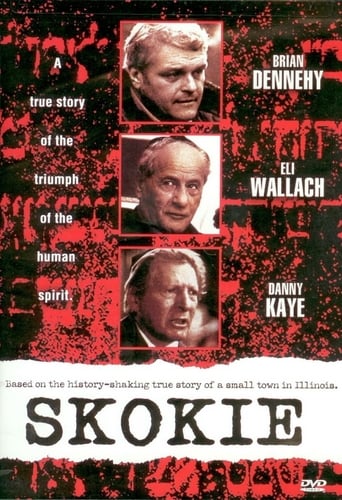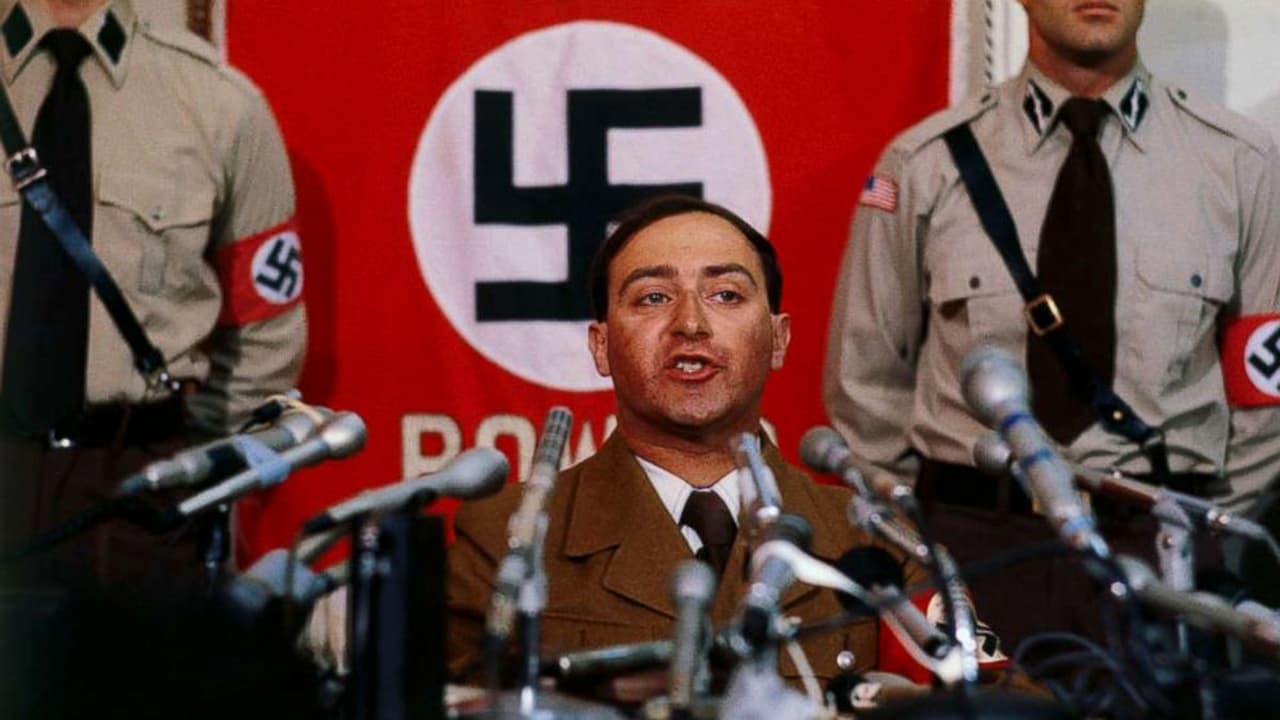bkoganbing
George Dzundza who ironically would be playing many Jewish roles later on in his career plays an American Nazi Party leader who is looking for a little headline grabbing. What to do, but stage a march and stage it in a town that has a large Jewish population, Skokie, Illinois, suburb of Chicago.The film Skokie is an account of the famous incident that never was because in the end Dzundza and his mouth breathers decide after all they didn't want to march in that "Jew town" anyway. But the question of his right to march, to assemble was in fact a constitutional issue. And the American Civil Liberties Union took on as it did this most unpopular of causes. The man who did it was John Rubinstein playing an attorney of the Jewish faith.What the film does demonstrate is the reaction to this publicity stunt from various people. The mayor of Skokie Ed Flanders is righteously offended and also mindful of his large Jewish constituency. The city attorney Eli Wallach who happens to be Jewish as well is eager to try any legal means to keep them out, but he also realizes the free speech and freedom of assembly issues. He and Rubinstein are finely matched pair of adversaries. Police Chief Brian Dennehy just wants to make sure public order is maintained without bloodshed. There are several generations of Jews in the town and they're deeply read in their culture, the young ones. But for Danny Kaye and Kim Hunter this is up close and personal. They are survivors of the camps and well remember what they didn't do back in the day and how friends, family, and neighbors paid when the Holocaust came. No one carrying that symbol of hate is going to march in their town, the hell with the American Civil Liberties Union. Skokie as it records the famous controversy in 1977 is finely cast and well crafted and could have also been a big screen theatrical release film. I wish it was in fact. Everyone should see this film.This marked the final feature film appearance of Danny Kaye whose last two roles, Skokie and The Madwoman Of Chaillot showed a fine dramatic talent that more than hints came out in such films as Me And The Colonel and The Five Pennies. We should have seen more of it, but Kaye was way too good a clown to keep that talent under wraps.Skokie is a must see film, a great tribute to the town and the people who were united in never seeing these people soil their fair city.
edwagreen
Danny Kaye again showed his talents as a brilliant dramatic actor in this 1981 television movie.He plays a Holocaust survivor who has settled in Skokie, Illinois after the war. Skokie has become a predominantly Jewish town and the serenity of the area is threatened with the Nazi garbage threatening to march through the town to cause the reopening of nightmarish wounds, fear and trepidation among the Jewish citizenry of the town.As the spokesman, Kaye conveys those fears but is adamant that the garbage shall not march. His voice is etched with unbelievable feeling as he will do anything in his power to thwart the threatened march.As the Nazi leader leading such a march, George Dzundza is quite effective as Nazi Frank Collin. Filled with hatred, and contempt for humanity, Dzundza also etched an unforgettable character. Of course, the picture belongs to Kaye and he received an Emmy nomination for best actor for it.There is only so much that an afflicted people can take- 1st amendment rights or not.
theowinthrop
In Danny Kaye's career (despite what is said on this thread) he made two dramatic and one half dramatic performances in movies. The half dramatic performance was in the film ME AND THE COLONEL, a comedy with Curt Jurgens based on a play by Franz Werfel, JACOBOWSKI UND DER OBERST (JACOBOWSKI AND THE COLONEL) about a Jew and and anti - Semitic Polish officer fleeing Warsaw in 1941 to avoid death by the Nazis. Though it has funny moments in it, the threat of Nazi brutality, and Jurgens slow change to respect and friendship for the Jewish Kaye actually made the story serious. Similarly Kaye's performance in THE MADWOMAN OF CHALLOT was also serious, as his big scenes dealt with the loss of the individual personalities of the different sections of Paris (as shown in their distinct garbage - he is a rag picker) and in his demonic (no better way of describing it) performance as the symbolic defender of the villains of the piece, on trial for their lives.SKOKIE was Kaye's final movie (not his last appearance on television). It was a major performance - this time in center stage and no clowning involved. It returned to the subject matter of JACOBOWSKI, but brought it up to date.It was based on a notorious incident of the late 1970s in Illinois. A resurgence of the American Nazi Party decided to have a march, and for added interest (as well as putting salt on wounds) it was marching not in Chicago but in a quiet area near the city called Skokie, which was where a large number of Jews - many European survivors and refugees of the Holacaust - lived. The Jews in the community were angered by this move, and fought it. But, after court action, the march was allowed. However, when the Nazis came to march they found hundreds of Jews on all sides of the street glaring at them. They completed the march, but the Nazis were thoroughly unnerved by the experience.Kaye is one of the survivors of the original Nazis and their activities in the 1940s. He is absolutely opposed to this march - he becomes the most outspoken opponent of it. He knows what quiet acquiescence to this garbage means - the Jews in Europe were quiet, too quiet, and it cost six million lives. The pressures of the re-occurrence hits his family, as his wife (Kim Hunter) also a survivor, begins collapsing under the strain - she's reliving the nightmare all over again. She feels it can happen here, and Kaye is determined that it shall not.George Dzunga is the local Nazi leader, who carefully planned the choice of Skokie to give the maximum hurt to the Jews he could. He also chooses the attorneys of the American Civil Liberties Union to represent his "fight for freedom of speech" argument. And to add icing to his evil, he chooses John Rubenstein, a Jewish - American attorney at the A.C.L.U. to be his attorney. Rubenstein and his mentor Eli Wallach are confronting the situation, but determined to do what their organization sees as it's role - safeguard the Bill of Rights against all attacks. And, as I said at the start of this review, they do win the court victory, but the Nazis find the victory more unsettling than they expected.The film also demonstrated something that is not usually discussed when dealing with the A.C.L.U. That organization always pushes the envelope a bit to make it's point about our rights - and sometimes goes beyond common sense. In a mostly secular America, some Christmas crèches don't have to be taken away because they violate church and state (if the A.C.L.U. actually believes in separation on that issue, why not demand that Christmas be returned to a solely Christian holiday rather than allow the courts and government buildings being closed - obviously their membership benefit by the holiday as well - I think they call that hypocrisy?). Inevitably when you are defending "rights" you are going to be tramping on people's toes. Most of us don't mind when it is an unpopular or static group (like a business who has some hiring policy that is questionable), but if you see that a large minority is being insulted by a "rights" issue the A.C.L.U. is involved in, you can see why that organization really needs to reevaluate what it is doing. But it won't.They were defending hate speech here - anti - Semitic material that Hitler would have been proud of. The A.C.L.U. would have said that our right to free speech is universal. But if that is true, the speech is unlimited - and I don't feel that that was the original intention. If the Skokie marchers had been met by thousands of hidden supporters, who were armed and went on a rampage of killing Jews afterward, the fine idea of defending such speech would have been meaningless. And just because it did not happen, does not mean that it can't.The film tackled this as well. Both Rubenstein and Eli Wallach face a double whammy in the course of the story. Both are Jews, and neither really love their client. It's their duty to do what they do for the Bill of Rights. But then the A.C.L.U. coffers suffered. Many Jews had been contributors until Skokie happened - now they felt obliged not to because it was taking a "pro-Nazi" stand. The A.C.L.U. would suffer financially for years for this blunder. Then the Skokie residence countered by a demand to know if the A.C.L.U. was denying the Holacaust occurred (as the Nazis claimed). Although they win the case, they realize they have lost tremendous credibility with former supporters.SKOKIE was a pretty fine movie - and well worth watching. It also leaves the issue of whether Free Speech is unlimited or not open even as the film ends.
Aleona
If you are a lawyer or a judge that is interested in a documentary movie that talks about a case and what happened, this you will like Skokie. There really isn't any great acting in it, in fact a lot of the dialogue of Kaye is cheesy and overly dramaiszed. Most roles are one dimensional and overplayed, but the director did convey the message of the trial and the consequences that followed.If you need to do a report on the Skokie trial, and you want your research to be somewhat entertaining then this movie may serve you a very good purpose, other than that I wouldn't recommend it.


 AD
AD


